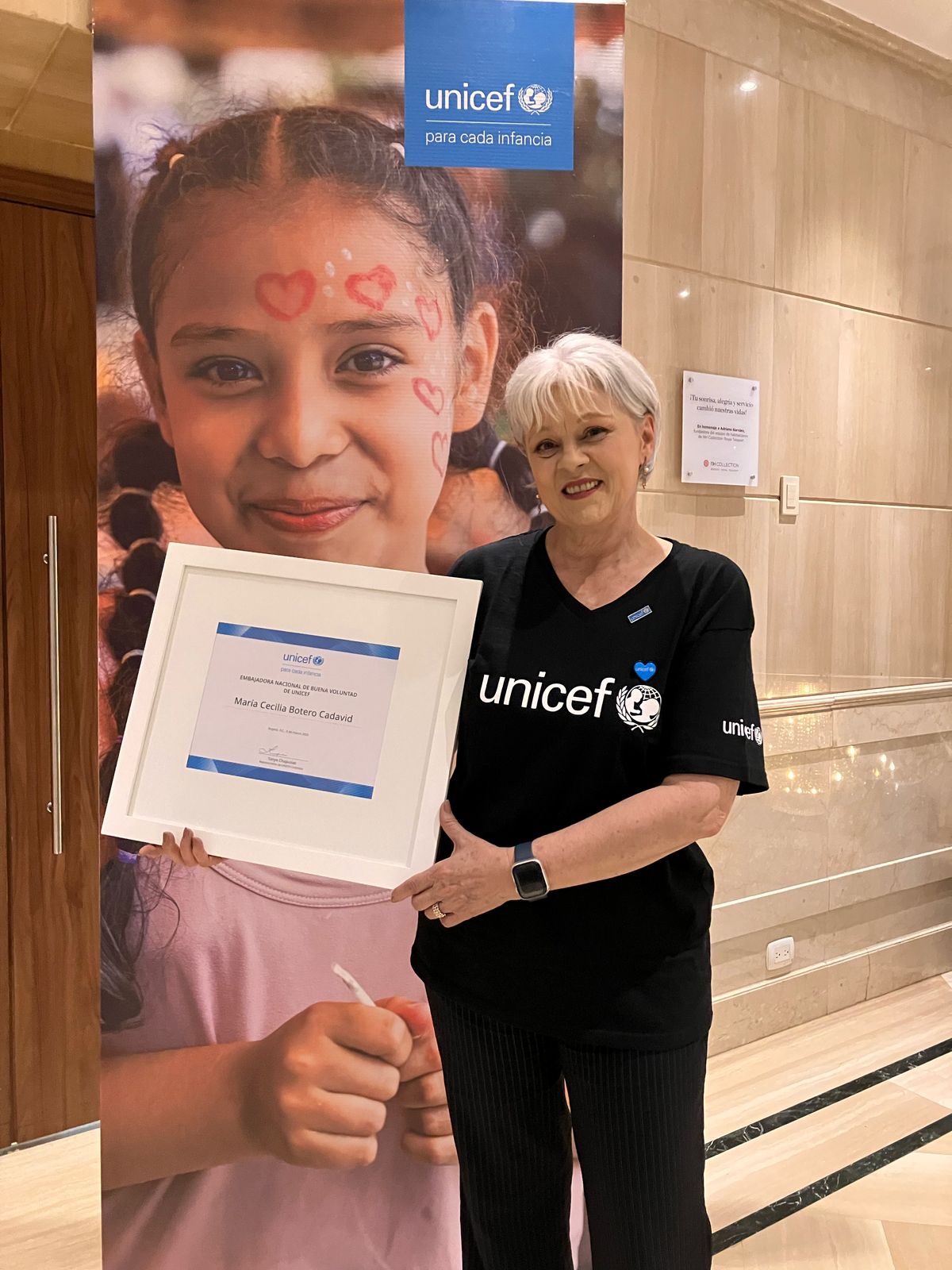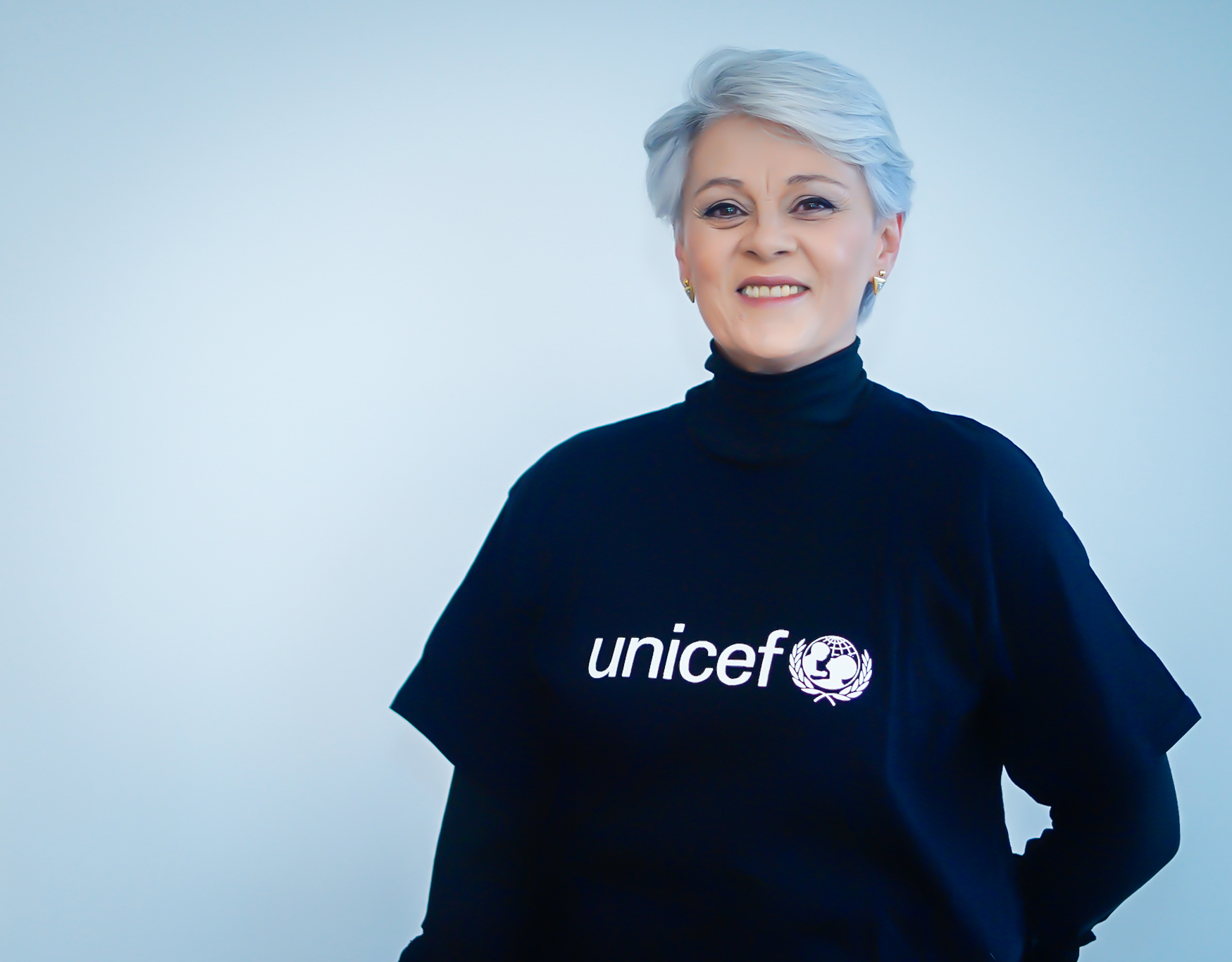María Cecilia Botero and her work with UNICEF Colombia: "There are girls who don't go to school because they don't have a bathroom."

María Cecilia Botero is 70 years old and has a full schedule : she gives interviews, presents an afternoon TV show - 'Mujeres sin filtro', on Canal RCN, alongside Flavia Dos Santos, Claudia Palacios, Kika Nieto and Natalia Sanint-, acts in theater, cinema and television - this year she appeared in the film 'Dora and the Search for the Golden Sun' and in the series 'Cosiaca'-, directs the academy founded by her father - La Charlot in Bogotá-, and makes time to work as a Goodwill Ambassador for Unicef Colombia (the United Nations agency that protects children's rights), one of the jobs that makes her happiest.
"The first time I became involved with UNICEF was when Mateo was born, in 1983. At that time, it had become fashionable not to breastfeed a baby. They said it wasn't that important and that breasts slumped and cracked. UNICEF asked me if I was going to be a breastfeeding mother, and I said yes. They then suggested I do a campaign to promote breastfeeding, along with my baby and my husband, David Stivel," the renowned actress recalls in an interview with EL TIEMPO.
Forty-two years later, she agreed to once again become the face of UNICEF Colombia, now through a plan called Solidarity Legacy, which is aimed at older adults.
Every so often, the media is flooded with names of celebrities who take on the role of goodwill ambassadors: Angelina Jolie, Millie Bobby Brown, Jackie Chan, David Beckham, Ricky Martin, or Shakira, and in the case of UNICEF Colombia, María Cecilia Botero joined others recognized for their commitment to the country's children, such as Nairo Quintana, Carolina Cruz, Daniela Álvarez, and Andrés Cepeda, to name a few.

Photo: Courtesy of Unicef
But what exactly does a Goodwill Ambassador do? The actress, model, presenter, and broadcaster from Paisa, with a half-century of artistic career, told us about her work and her goals as the face of the Solidarity Legacy.
What does a Goodwill Ambassador do? It's not just about being the face of UNICEF, but also having a job there, an important role with UNICEF. The first thing is being willing to collaborate with whatever they need, at certain times. There's so much to do that there will always be a need for people to support, but I believe the issue of goodwill ambassadors, as well as the presence of public figures, is fundamentally about seeking rapprochement with the population, with the people, a meeting of credibility. Because there's also mistrust about whether these programs are real, whether the money goes where they promise, so if there's someone you can believe in, it helps in some way. Although UNICEF is something super serious. But if Andrés Cepeda speaks, people adore him, they believe him, you understand? Our job is also to ensure that UNICEF's name has that credible image. In my case, I work as a leader, as the official spokesperson for a special program, addressing a specific group of people to tell them what it's about. We do talks, webinars, whatever it takes to explain how they can collaborate.
What is the Solidarity Legacy program about? Look, it's worked very well in Europe for years; here it's relatively new, it's been around for five years. It's aimed more at older people. Here in Colombia, we want people to start being more aware of leaving things in order when they're going to leave, of making a will. There are many people who die, who lived alone, and their apartment, their things are lost, we already know who will end up with them. You don't need to be a millionaire to make a will; let it be what you have. It's important to be clear about what you want to do with your things. Of course, you want to leave it to your children, your wife; but you can leave a percentage to UNICEF. Or people who buy life insurance and the beneficiaries are so-and-so, but they can leave a percentage to UNICEF. Here there are people who live in small apartments and have enormous works of art, they don't know what to do with them, selling them is a hassle. Why not donate them to UNICEF, which can handle the sale and invest the money where it's most needed? Why not think about children who don't have opportunities? But here in Colombia, wills aren't used; people think you have to be a millionaire to make one, and that's not the case.
How does UNICEF distribute donations? What's raised in Colombia is for Colombia. Throughout my life, which hasn't been short, I've received calls from many foundations, and I've helped them; but suddenly you realize that there are many foundations that don't send the money where they say it's going. On the other hand, I know UNICEF is very serious. I've gone with them to the regions, to La Guajira, Barranquilla, Chocó, Cauca, seeing what they do, so I know. I've received calls from children thanking one. Once, a girl called me, happy because she finally had a door on the school bathroom, she could go in safely... I mean, such basic needs, but these girls didn't have a closed bathroom. In this country, female dropout rates are much higher because girls in these areas, when they get their period, have nowhere to change. So, imagine, every month they miss a week. These are things that don't even cross your mind. For example, every day we wake up, turn on the tap, and water comes out. In Barranquilla, I was in a place where they brought water because there wasn't any. The happiness of this community was enormous because they now had their own tanks for washing dishes, for cooking, for drinking water. These are things that, my God, make one feel pain, such great needs. So if you can do something, even a little, you have to do it.
It seems unbelievable that we are like this right now. All the technology, everything you want, and yet there are still girls who don't go to school because they don't have a bathroom. Such absurd things.

Photo: Courtesy of Unicef
In kind, too, in the sense that they can be monetized. For example, the works of art we were talking about, or if I have a giant piano and I don't know what to do with it, I donate it, they sell it, and with that money, they help.
In addition to motivating donations, a presence like yours is sure to make recipients happy in places where no one else goes... Imagine. And children who have seen you on television at some point; seeing you there, in person, is divine. Hugs, displays of affection are such a beautiful thing, really. Making them happy is important.
Why is the mission of Goodwill Ambassadors so important? In addition to motivating people to help, I believe it's essential that they believe in UNICEF, and that they believe in the difficult reality that so many people face. Many don't believe or don't want to believe. I think there's a strange apathy, a sense of "I'd rather not." In that sense, it's welcome. For example, if they organize an Andrés Cepeda concert, it's sure to be very attractive; there, you can be very useful as a public figure. Going to talks with people, to the local area, and seeing them connected to it is very valuable. In my case, I speak a lot to senior citizens and notaries, so that when people go to make a will, they can tell them about the UNICEF Solidarity Legacy, explain what it's about, and how they can do it. Here in Colombia, there are so many places where help is needed, so anything helps, and it really doesn't have to be large amounts: if it's 10 million pesos, it's a lot that can be done; it's enough to pay for three children's schooling.
eltiempo




